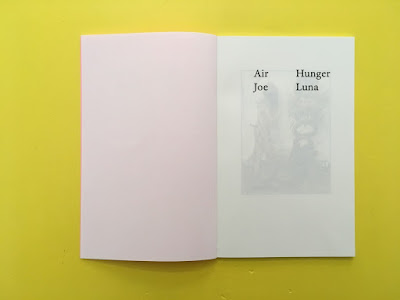Dear all,
I hope this finds you thriving, by which I mean, spitting blood and fire, recuperating, revolving on various platforms of multilateral desire and destruction. I
’ve had to abandon the letter I was trying to compose to you about
Samo Tomšič’s The Capitalist Unconscious: Marx and Lacan out of frustration; it was becoming unwieldy, full of quotation and scraps of response I
’ve been putting together all week, and it wasn
’t hanging together. For some reason I feel compelled - duty-bound even - to respond to this book in the company of poets, because the questions it raises are, I think, inordinately poetical. But I also screwed up the letter because I felt it was becoming too much like a tirade instead of a critique. Have any of you seen Tomšič
’s book? Tom, I know you are at least familiar with his work, but I don
’t know if K, Danny or Ed have seen it? It
’s just out from Verso, and I did an inside job and got a copy which now lies spreadeagled before me, covered in scribbles and upsets. I think this theory has compelled me to write to you about it because of some powerful disconnect between my sympathy with its aims, and my (low) level of satisfaction with its premises and methods of argument. It seems to me to be a book which manages to articulate quite virtuosically the absolute limits of theoretical discourse; not theory
’s most profound insights or possible lived ramifications, but its limits. The avowed aim is thus, spoken through Tomšič
’s description of the
“project
” of psychoanalysis and Marxism:
“The shared logical and political project of psychoanalysis and Marxism is to determine the terrain in which the subject is constituted and to detach this subject from its commodified form that capitalism imposes on everyone through direct forms of domination as well as through the hyper-fetishisation of financial abstractions.
”
The project of determining the terrain is a structural one; thus Marx is read through Lacan:
“Marx never intended to elaborate a communist worldview and [...] speculation about the future social order did not belong in his mature critical work,
” since it is all groundwork for beginning to think social change itself:
“Marx
’s critical project repeatedly shows that the passage from interpretation to political action involves a move from the production of philosophical, political and religious worldviews [...] to a materialist interpretation that, in quite the opposite fashion, uncovers the very gaps that existing worldviews strive to foreclose. By detecting these structural gaps, the materialist method provides a rigorous understanding of
logical relations that support the capitalist social link, thereby also detecting the structural disclosure that enables one to address the question of change. It is precisely at this point that Lacan intervenes in the debates regarding Marx
’s epistemological and political coordinates, proposing a structuralist reading that implies a much more unorthodox, albeit no less politically radical, Marx.
”
I suppose my issue here is that I distrust how really radical this kind of Marx can be. This move of claiming a kind of binary trajectory,
“in quite the opposite fashion,
” seems to dive straight into the desiccated gristle of Althusserian structuralism without maintaining the speculative element that would provide for the opening onto something as derisively dismissed as a
“communist worldview.
” As he was
“the first theoretician of the symptom,
” in Marx
“the proletariat
is the subject of the unconscious. This means that the proletariat designates more than an empirical class. It expresses the universal subjective position in capitalism.
” And further:
“With the shift from the proletarian seen simply as an empirical subject to the subject of the unconscious, the notion and the reality of class struggle also appears in a different light. It no longer signifies merely a conflict of actually existing social classes but the manifestation of structural contradictions in social
and subjective reality, thereby assuming the same epistemological-political status as the unconscious.”
Thus, some fifty pages later, and this claim is stressed throughout:
“Capital is about structural and not empirical or cognitive reality,
” a claim based entirely on a reading of the few opening chapters of
Capital.
Now it seems to me, with my limited knowledge of Lacan, that the topographical shape of this kind of theory might be useful to us. It tries to make structurally co-extensive the universal domination of the commodity form and the structure of fantasy, and by doing so the polemic wants to understand the imminent and
“permanent instability
” of this co-extension. One more quote:
“Psychoanalysis and the critical of political economy are conditioned by this epistemological paradigm. The unconscious and class struggle, two real cracks in the social and the subjective reality, can be encountered by pushing the discursive consistency to its limits.
”
Nevertheless it
’s at points like this that, in full cognizance of my own fucking cognition, I throw the damn book out of the window and scream in exasperation that perhaps class struggle could be
“encountered
” more comprehensively in the camps in Calais or in the streets of Baltimore. The value of this kind of theory is that, as I say, what it determines as co-extensive seems to be something like the
“terrain
” on which lots of important poetry is currently working. But its utter limits are something like the following (I admit I have lost the critique and am now blazing my tirade):
1. Marx
’s
“project
” is treated as such, a
“project,
” whereas I am interested in - and I think you are all interested in - Marx
’s
writing. The limits of a
“project
” are precisely in the universal applicability of its concepts. Thus class struggle is promoted to the structure of the unconscious, making
“domination
” something indistinct that we can begin to
“encounter,
” rather than something that is infinitely mediated by class position, race and gender, to name a few.
2. The way Tomšič
’s book is put together seems to prove my worst fears about readings of Lacan that draw out (what Leo Bersani at Sussex recently called)
“the domination of the signifier
” in such a way to render subconscious activity a kind of robotic schemata. In this way, and in Tomšič
’s book too,
“domination
” becomes something that operates unilaterally across minds with no distinction, as I
’ve said, between classes - let alone races or genders. But this is the point, of course. The reorientation of class in the service of the logical revelation of the structure of both the unconscious and society severs the personal connection between them - precisely the aim of the theory:
“There is no social relation.
”
3. But far from allowing therefore the disclosure of the permanent instability of the system, which is now everywhere and nowhere, aren
’t the real bloody bodies, not just of Chapter 10 of
Capital, but of a Pakistani construction worker in Qatar or a Syrian refugee, hereby rendered simply a part of the
“permanent instability
” of the structural relation that we need to examine to encounter class struggle, rather than the actual actionable social imperative that Marx was writing?
4. It
’s at this point in my thinking about Tomšič
’s book that I feel a little like a kind of Eagleton with a sledgehammer. Maybe that
’s too much; I feel like there are plenty of ways in which theories like Tomšič
’s can help us think injustice and domination. But I come back to something like this: don
’t we need a cognitive subject to do the very work of shifting the epistemological paradigms that Tomšič threads so laboriously together? And doesn
’t the promotion of class struggle to an unconscious universal misrecognise the real work of activism for the pseudo-repetitions of May
’68 under the guise of demanding a new master? What cognition, where, and whose?
5. I don
’t suppose Tomšič would deny that we
“cognitive subjects,
” just that they have anything to do with Marx
’s
“project.
” Thus:
“Marx
’s critical method cannot envisage an overall abolition of fetishisation but the detachment of politics from the reign of economic abstractions, which has been intensified by decades of neoliberalism. The liberation of politics consequently means the same as the abolition of the rootedness of social links in the commodity form as their unique formal envelope.
” The theory is the power of this methodology to allow the space to think a new politics - that fetishised catchphrase of everyone from Agamben to Cameron.
6. The final power of Tomšič
’s book is in its production of a virtually inescapable dead end. The dead end is that we cannot think social change before we attend to the structural critique of the constitution of subjects for capitalism. But this end is precisely deadening: it strips the cognitive subject of the life through it would be possible to think that shift. It ends up being far more utopian than the
“Freudo-Marxists
” it descries, because it creates such a profound and limited break between 1) where and what we are, and 2) where and what we need to get to.
These points are probably desperately unsophisticated. I think it is a completely fascinating to move to ensure we encounter class struggle as a structure of subjective reality, and I think it could and does open out all sorts of micro-struggles in the structure of daily life that I find examined and exacerbated in our poems. But I think the reason I
’ve been so interested by this book is that it seems to be doing precisely half of what I consider our poems to be doing at their best, which is to innervate both the structures of domination and the lives that struggle vitally within them, to be both the structure and the cognition of subjective life, to be both the exhaustion of language in the diagnosis of domination and the gift of bloody commitment to lives outside of it. I don
’t think I
’ve encountered any theory capable of thinking this kind of thing. The accusations of idealism this would elicit from the Lacanian seem to me at the moment to be nothing less than the illiterate schema of a bad reader of poetry. Marx happened to be a great reader of poetry, and I think that poetry for him becomes a site of the constant struggle of the living tissue of historical expression in the structures of character and genre. Tomšič
’s book is like a perfectly valid, theoretically inescapable dead end:
“the movement of the critique of political economy proceeds [...] from the economic forms of knowledge to the progressive deduction of the subject of value, where also the horizon of a possible transformation is outlined, albeit without a prospective insight into the future social order.
” Our poems are not dead ends but living ones, in which what is here nominated as
“transformation
” is not so monumental as
“the horizon,
” flat-lining on the edge of a paradigm, but is rather fluid and malleable and distended enough to be the consistency of every beat and line, the shining promise of nothing so glib and frustrated as a
“future social order,
” but of forms of sociality that are
impossibly already with us.
Please dive in and give all this a good kicking.
With lots of love,
Joe x
















